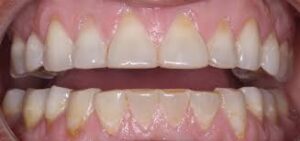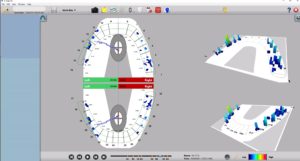
For people who are familiar with the term “TMJ,” most think of it as a problematic condition of the temporomandibular joints. These joints, located on each side of your head just in front of the ears, get quite the workout all day, every day. They are what connect your lower jaw (mandible) to the upper jaw (maxilla) and cranial structure (skull).
These joints, like other structures in the body, rely on a careful balance in order to function properly. It doesn’t take much, however, to throw this balance off kilter; the greatest factor being bite misalignment.
When the bite is “off” (or misaligned), it means that the top teeth are not resting on top of the lower teeth harmoniously and not functioning congruently. This can be caused by a number of factors, such as having crowded or crooked teeth, missing teeth, improperly sized crowns (or bridgework), or having conditions such as an “open bite.” An accident or injury can cause this and even having a congenital propensity.
In speaking and chewing, a disparity in bite alignment typically extends well beyond the mouth. It’s similar to those who have one leg shorter than the other. Although the hips adjust somewhat to compensate, the hip joints endure the brunt of the unevenness. Eventually, the wear and tear causes problems.
This is also the case when it comes to the TMJ. Initially, bite misalignment may cause discomfort in the joints. It may be more noticeable when eating or speaking. During sleep, it can trigger night-time clenching or grinding as the jaw seeks a position of comfort and balance.
Dr. Barbat explains TMJ Disorder
It’s not unusual for people who are grinders or clenchers to wake up with sore jaw joints, aching teeth and/or headaches (that may develop into migraines). For some, the soreness or pain can linger for most of the day and even worsen throughout the day. And, to little wonder. Some people clench with such force severe enough to crack a walnut. These actions can also cause teeth to wear down, chip or break.

Worn teeth from night-time grinding
In looking at problems that can originate with TMJ problems, some may never be assumed to have a connection to the jaw joints. These include:
Clenching, Grinding During Sleep… As the jaw joints endure stress or strain day after day, year after year, they become inflamed. This inflammation extends out to facial muscles. Eventually, it can reach neck and shoulder muscles, cause soreness or a tight feeling. Headaches are common with long-time TMJ disorder sufferers. Migraines can also stem from the tenseness in facial muscles triggered by the jaw joints.
Headaches, Migraines… Many migraines are felt to be severest at the top or side of the head. However, muscles that extend from the base of the skull and up to the jaw joints may actually be the trigger to some migraines or headaches. These muscles help in speaking and chewing. They can tighten significantly when people grind or clench teeth. The tension can extend to other muscles and lead to headaches and migraines.
Dizziness, Vertigo... Some people experience dizziness or vertigo that originates with the TMJ. Vertigo is a condition that can cause: the feeling of falling; sensing that objects are moving; nausea; confusion; and/or feeling lightheaded. Although the problem actually stems from the inner ear, the inner ear can be reacting from inflammation coming from the TMJ.
How? The inner ear contains sensors that help to regulate our sense of gravity. These sensors transmit signals to the brain to help the body adjust to keep a balanced stance. Because of the TMJ’s proximity to the middle and inner ear, inflammation can cause these signals to be altered and lead to an “off-balanced” sensation.
Ear Ringing, Tinnitus… Some of the muscles, ligaments and nerves used in chewing extend into the middle ear. The nerve supply from the TMJ has been shown to have connections with the parts of the brain involved with hearing and the interpretation of sound. Because certain nerves serve both the jaw and the eardrum, problems involving the muscles, cartilage, and ligaments of the jaw joints can lead to tinnitus. It is also felt that pain associated with TMJ disorders can aggravate pre-existing tinnitus.
Tingling in the arms, fingers… In some cases, TMJ disorders can cause a patient to hold the neck in a position that is unbalanced. This may be in an attempt to alleviate the pain in their jaw. However, this can cause pressure on the nerves surrounding the neck for some people, which can lead to numbness and tingling sensations in the arms and legs. In some individuals, it can also be the reason for involuntary muscle twitches.
Sleep Apnea… Studies are showing a close relationship between people with TMJ Disorder (TMD) who also suffer from obstructive sleep apnea (OSA). Through advanced imaging technology, researchers are now better able to assess how the connection exists. In one study, 75% of patients diagnosed who had sleep apnea also reported TMJ pain.
As a Neuromuscular dentist in Shelby Twp MI, I have acquired specific skills and understanding that helps in locating the source of TMJ-related pain. In our Macomb Co. dental office, we also feature some of the most advanced diagnostic technology available. This technology can pinpoint the precise cause of TMJ disorder, if the TMJ is indeed the cause of a patient’s problems. Our advanced technology also means that patients can avoid unnecessary or lengthy treatment so they receive the most conservative treatment for desired results.
Dr. Barbat explains Advanced Technology
Some of this technology includes Cone Beam 3D imaging. This is a quick and painless process that captures clear, concise and intricate views at the lowest radiation levels possible. In one pass, these images are ideal for assessment of the jaws and evaluation of the TMJ (jaw joints).
We also use the BioPak system to record the functions and congruity of the upper and lower jaw, jaw joints, and associated muscles at various ranges. This information is a significant aid in proper diagnosis and treatment planning for TMJ disorder as well as sleep disorders and craniofacial pain.
TEKSCAN (T-Scan™) is also featured in our Shelby Township dental office. T-Scan is the only technology that shows the measured force and timing of chewing surfaces coming together for the overall bite.
There is certainly a significant need to maintain the delicate balance in the mouth. When it comes to the muscles, joints, bones and teeth working together, a Neuromuscular dentist can help you regain the proper balance needed – and enjoy days (and nights) without TMJ associated discomfort.
If you have frequent headaches, migraines, jaw soreness, ear ringing, dizziness, tingling in extremities, neck or shoulder pain, jaw popping or difficulty opening the mouth fully, bite misalignment is likely to blame. Don’t allow these problems to worsen and leave you with chipped, broken, worn or fractured teeth – and pain that will worsen over time.
To discuss your options and the diagnostic process, call 586-739-2155 or Tap Here to request a free, no-obligation consultation.